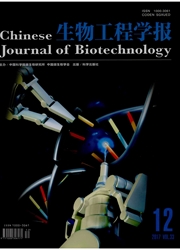

 中文摘要:
中文摘要:
神经细胞黏附分子(Neural cell adhesionmolecule,NCAM)是一类表达于神经元、胶质细胞、骨骼细胞以及自然杀伤细胞表面的糖蛋白。NCAM在细胞.细胞黏附及神经细胞迁移等过程中起着重要作用,也是用来研究多聚唾液酸(Polysialicacid,PSA)的模式蛋白。将来源于小鼠乳腺上皮细胞NMuMG中的NCAM基因克隆到真核表达载体pcDNA3.1(+),转染至中国仓鼠卵巢细胞突变株1dID-14细胞中,通过抗生素G418筛选及蛋白质印迹法检测,得到过表达NCAM的永久转染细胞株。利用1dID-14细胞的特性,通过在无血清的基本培养基中添加半乳糖与否可以轻易操纵NCAM分子上糖链的修饰,为后期研究糖基化对NCAM分子功能的影响提供工作基础。
 英文摘要:
英文摘要:
Neural cell adhesion molecule (NCAM) is a glycoprotein expressing on the surface of neurons, glial cells, bone cells and natural killer cells. NCAM plays an important role in the process of cell - cell adhesion and cell migration, and is also a model protein to study polysialic acid. In this paper, NCAM gene from mouse mammary gland cells (NMuMG) was cloned into eukaryotic expression vectors pcDNA3.1(+) and transfected into mutant Chinese hamster ovary cells ldID-14. The stable transfection over-expressing NCAM was obtained through the G418 selection and confirmed by Western blotting. Due to unique characters of ldID-14 cells, carbohydrate chain of NCAM molecule can be easily manipulated with or without adding galactose in the serum free medium, and this modification can provide the basis for further studies on the effect of glycosylation on NCAM molecular function.
 同期刊论文项目
同期刊论文项目
 同项目期刊论文
同项目期刊论文
 Enhanced expression of polysialic acid correlates with malignant phenotype in breast cancer cell lin
Enhanced expression of polysialic acid correlates with malignant phenotype in breast cancer cell lin 期刊信息
期刊信息
